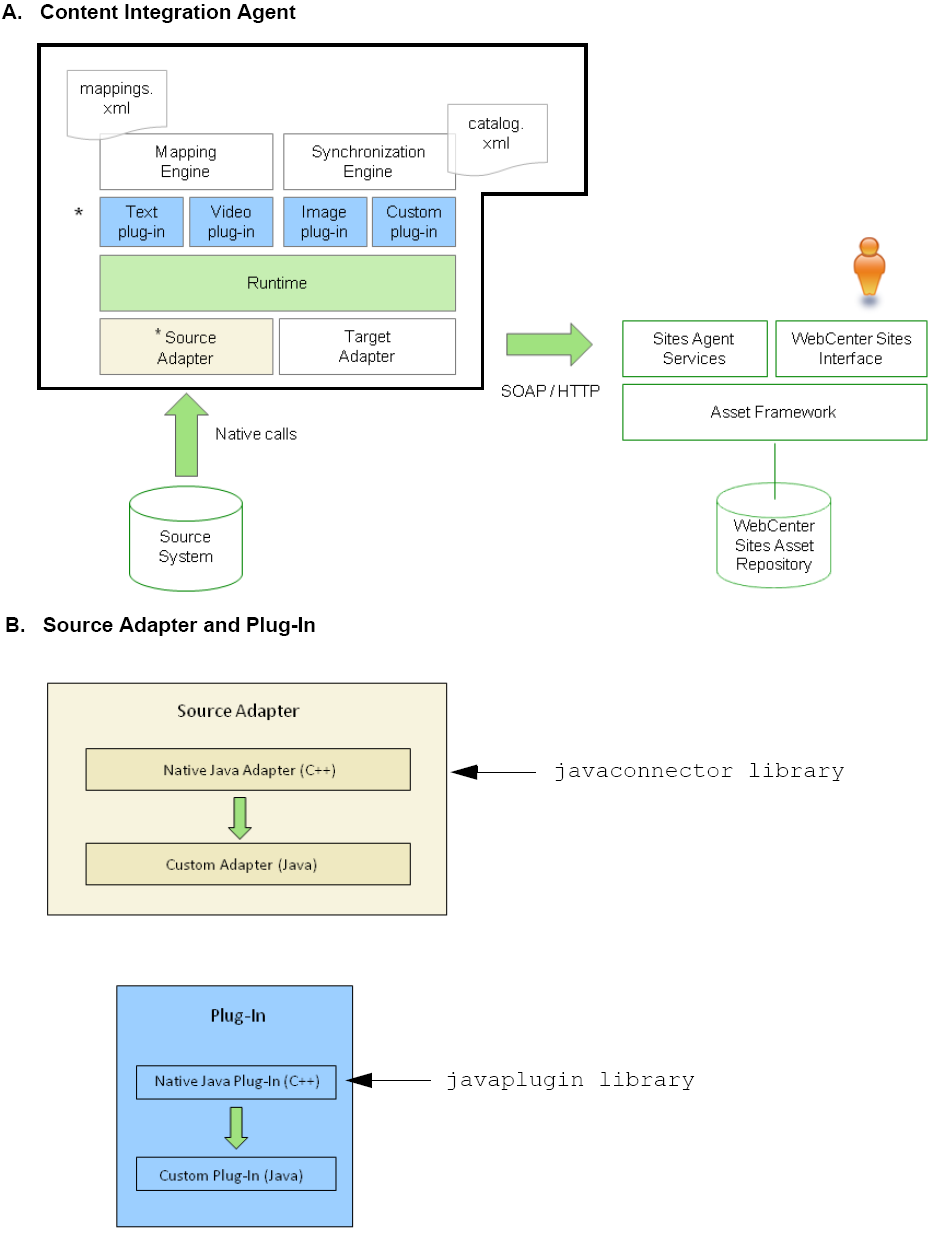94 Integrating with Custom Source Systems
This chapter outlines methods for extending Oracle WebCenter Sites: Content Integration Platform to support content delivery from custom source systems to Oracle WebCenter Sites.
This chapter contains the following sections:
94.1 Customizing WebCenter Sites: Content Integration Platform
Content Integration Platform (CIP), by default, delivers content from file systems, Microsoft SharePoint, and EMC Documentum to Oracle WebCenter Sites. Developers can extend Content Integration Platform to publish from a system of their own choice, such as a database or custom content management system, by writing a Java-based implementation consisting of a source adapter and plug-in(s), or just the adapter. Both the adapter and the plug-ins are supported by the Content Integration Agent component. See Section 94, "Integrating with Custom Source Systems."
A Java source adapter must be written for each source system whose content will be delivered to Oracle WebCenter Sites. The adapter queries the source system to retrieve its metadata and binary content. The adapter must be registered with Content Integration Agent by means of a statement in the catalog.xml file.
A plug-in is required only if items retrieved by the adapter must be processed before they are published to WebCenter Sites. Processing could include for example, extracting thumbnails from image files or performing a validation step while publishing. Typically, plug-ins are written to support different file formats or to filter selected items from the publishing process. Any number of plug-ins can be used with any adapter. Like the adapter, a plug-in must be registered with the Content Integration Agent (in the types.xml file).
94.2 Content Integration Agent
Content Integration Agent is written in C++ and provides the following components to support Java-based custom connectors and plug-ins:
-
Solid runtime system.
-
Pluggable interfaces, used to implement Java-based source connectors and plug-ins.
-
XML files named
catalog.xmlandtypes.xml, both used to register the custom source adapter and plug-ins. -
Native source adapter (
javaconnectorlibrary) and native plug-in (javapluginlibrary). Both are written in C++. They are used to make calls to Java code. -
Facilities, which are construction blocks providing some set of functionality to the Agent runtime. Content Integration Agent hosts the Java Virtual Machine in its process space in order to delegate calls from the C++ runtime environment to Java code. The JVM is enabled by registering
javafacilityinfacilities.xml.
Once the Java-based adapter is created and the JVM is enabled, the C++ Agent runtime system can use the JVM to call Java code via the native adapter (similar process for plug-ins).
Procedures for creating Java-based connectors and plug-ins are given in Chapter 95, "Creating Adapters and Plug-Ins" along with instructions for completing the integration.
-
For more information about Content Integration Agent, see the Oracle Fusion Middleware WebCenter Sites Administrator's Guide.
-
For more information on the Content Integration Platform for File Systems and Microsoft SharePoint, see the Oracle Fusion Middleware WebCenter Sites Administrator's Guide.
-
For more information on the Content Integration Platform for EMC Documentum, see the Oracle Fusion Middleware WebCenter Sites Administrator's Guide.
